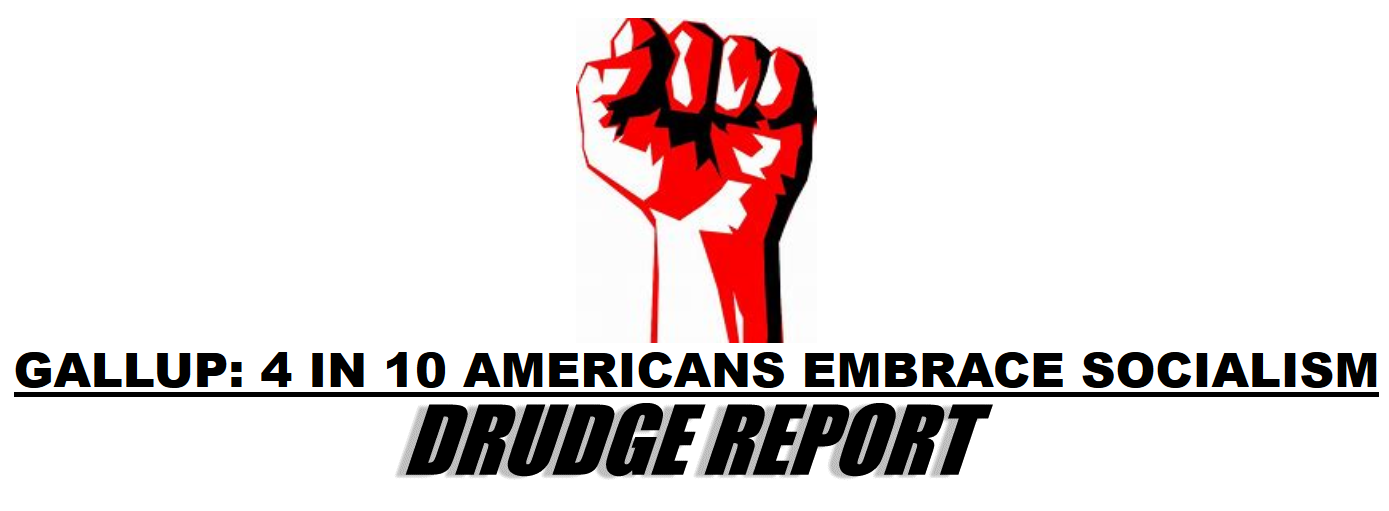A new poll from Gallup finds that 51 percent of Americans reject socialism and call it “a bad thing,” contrasting with just 43 percent who say it is “a good thing.”
That’s probably not the headline and lead you were expecting. Gallup heralded the finding that “Four in 10 Americans Embrace Some Form of Socialism,” which similarly ran on the Drudge Report during the morning of May 21.
It paints a picture of socialism on the rise. But is that really what is happening?
Left out was the important part, which is that a majority of Americans still reject socialism. If you take out the undecideds or no opinion, the number who reject socialism rises to 54 percent.
But I understand either the alarm or glee — depending on the reader’s perspective — that almost but not quite a majority of Americans want socialism. 43 percent is way up from 1942, when just 25 percent thought socialism was “a good thing.”
So, is America ready to nationalize industries and assume the means of production? As noted by prior Gallup surveys, the definition of socialism depends on the respondent. 23 percent define it as “Equality — equal standing for everybody, all equal in rights, equal in distribution.” 17 percent think it is “Government ownership or control, government ownership of utilities, everything controlled by the government, state control of business.” Another 10 percent thought it meant “Benefits and services — social services free, medicine for all.” And another 6 percent thought it meant “modified communism.”
Meaning support for the policies could be largely dependent on whether respondents view it as some sort of national government takeover or some way promoting equality of outcome and getting free services from the government. In truth, it can mean all of those things, since they describe different policies and aims that recur in socialist regimes.
The result, if viewed in the context of support for socialism rising, is actually not very surprising. The Democratic Party has increasingly embraced single payer, universal health care, the Green New Deal, college for all and universal basic income over the past several years. These have rapidly become default positions for the party and have developed into the second choice in American politics.
And so with Democratic leaders, such as Vermont Senator Bernie Sanders who is running in 2020, openly embracing these positions, it is unsurprising that a large plurality of voters are following their lead.
Believe it or not, effective leadership in the political realm can have a major impact on the national dialogue. Not convinced? Well, how many Republicans were talking about unfair trade deals, jobs going overseas and getting tough with China before President Donald Trump came along?
Trump took the GOP by storm in 2016 running on an unconventional platform. Republicans had been wrong about trade and immigration and foreign wars, he said. U.S. policy was more concerned with promoting economic growth somewhere else with bad deals like NAFTA, finding jobs and promoting citizenship for illegal aliens and securing freedom for people they’ve never met and who might not appreciate the sacrifices being made by our military. It was time to put America first.
It worked. In a single swoop, Trump knocked out three key pillars of prior Republican administrations, shattering the free trade consensus, pushing for securing the border and being smarter about projecting American strength abroad. During the nominating process, Trump turned the GOP establishment on its head and shifted public opinion in his direction.
Today, Trump enjoys sky-high 90 percent approval among Republicans according to Gallup as he followed through on those key promises. The tariffs on China went up, the wall is getting built and the U.S. presence in Syria was minimized, with plans for Afghanistan on the table. Trump moved his party.
And so it is with socialism increasingly being embraced. Going with Gallup, 57 percent of Democrats had a positive view of socialism in 2018, up from 53 percent in 2010, with just 16 percent of self-identified Republicans sharing that view.
But this may be a high water mark for supporting socialism, Market Research Foundation’s Manzanita Miller and Bill Wilson found in a recent Daily Torch oped, “No, AOC is not the new normal and young people are not socialists,” analyzing 2019 and 2008 results of the Institute of Politics at Harvard of younger voters, which actually finds support for socialism slipping when comparing Millennials (those born after 1979) to Generation Z (those born after 1996).
Per Miller and Wilson, “the Harvard Youth Poll from 2008 which showed a full 46 percent of young people considered themselves liberal or liberal-leaning, while 19 percent considered themselves moderate, and 35 percent considered themselves conservative or conservative-leaning…. Just 27 percent of 18 to 29-year-olds now consider themselves liberal… Meanwhile, the share of young people who now consider themselves moderate has more than doubled, from 19 percent in 2008 to 45 percent in 2019.”
The piece added, “a majority of Generation Zers are political moderates who support America First policies on issues like illegal immigration and foreign wars, and are critical of big-government policies that they fear could negatively impact economic growth,” citing Market Research Foundation data. 58 percent of Generation Zers think illegal immigrants should either be deported or go through proper procedures to stay. 68 percent agree with the statement, “I don’t like seeing money that we can be using on our country’s needs being used on another country.”
In a separate analysis, Market Research Foundation defies conventional political wisdom and urges conservatives not to disregard young people as a voting bloc, stating, “don’t write off the youngest Generation as disruptive self-involved leftists incapable of rational thought. A significant amount of research indicates this generation favors the rule of law, is reluctant to accept a social justice narrative, and is critical of the mainstream media’s perpetual putdowns of the President. Generation Zers largely identify as Independents, and hold more libertarian views on foreign policy and putting America first than Millennials.”
Meaning, today’s youngest Americans eligible to vote are far more moderate than just a decade ago. There is room for conservatives to make inroads, and indeed, doing so is critical to the Republican Party’s future existence.
But, again, these trends are very much like looking in the rear-view mirror. They do not predict the future. A persuasive leader running on an openly socialist platform could one day in the not so distant future overcome the current gap and get elected, by transforming the national dialogue and bringing younger voters to that side of the political spectrum. The good news for those who still believe in limited government, private property and free market economics is we’re not there yet — and there is an opportunity with Generation Z to make certain we don’t get there.
Robert Romano is the Vice President of Public Policy at Americans for Limited Government.








